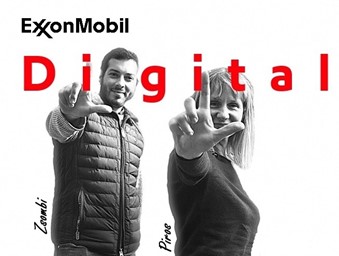Interview with Zsombor Tokes, Digital Innovation Site Lead for ExxonMobil Hungary.
Zsombor started with ExxonMobil 7 years ago as experienced hire. About a year ago, he became the Lead of Digital Innovation for the Budapest Global Business Center (GBC) site with ~2000 employees. Zsombor will guide us thru his experience how we can leverage on our current skillset and build on them towards pursuing a digital career at a large, global company such as ExxonMobil.
What does a digital career in a Shared Services Center (SSC) entail, and how does it differ from traditional roles?
Digital roles often revolve around using advanced technologies such as automation, artificial intelligence (AI), and data analytics to streamline processes. Digital careers are typically tasked with analyzing large datasets to provide insights that can inform strategic decisions. This analytical approach fosters a culture of data-driven decision-making.
Can you describe the key skills and competencies that are essential for success in digital roles within an SSC?
Based on my experience at ExxonMobil, I would highlight the following competencies or interest/aptitude (beside multiple others) that I think are essential to successfully pursue a digital career, of course alongside with traditional roles as Adaptability (.g. to quickly changing tools and technologies), Customer-Centric Mindset (to understand needs to be able to design digital solution that improves user experience) and Problem Solving. These would be: Technical interest and familiarity with digital tools, Data Analysis Skills for interpreting data, Project Management for effectively leading digital initiatives. And last but not least Adaptability and Agility in line with Business Acumen which can enhance the effectiveness of digital strategies.
How has the increasing integration of digital technologies impacted the jobs?
The increase of digital technologies in ExxonMobil GBC similarly to most companies, has gradually transformed job functions and roles in several key ways.
Many repetitive and administrative tasks have been automated such as RPA (Robotic Process Automation), OCR (Optic Character Recognition) or other solution that digitalizes data into a structured format. This shift allows us to focus on more strategic and creative, innovative activities to further better our processes.
Digital technologies enable ExxonMobil too, to leverage big data and enhanced analytics. Many roles are oriented towards data analysis, interpretation, and decision-making, requiring new skill sets in data literacy and analytical thinking.
As technologies evolve, employees need to continuously upskill or reskill. Job roles are shifting towards lifelong learning, encompassing new digital competencies and adaptability.
What are some examples of digital projects or initiatives you’ve been involved in at the SSC, and what were the outcomes?
Working with ExxonMobil is always an adventure and full of opportunities to participate in projects. I’ve been deeply involved in several digital initiatives aimed at streamlining operations and improving decision-making through automation. One key project focused on reworking how we track KPIs in the Purchase Accounting space. From all of the project I participated in, there is one recent initiative, that really challenged me in different way. This project was about establishing a Digital Innovation Program for the entire Budapest GBC that focuses on talent development and digital upskilling.
Our goal was to support our ExxonMobil colleagues become more proficient with digital tools and methodologies that are increasingly critical to our operations. We designed a structured learning program that offers learning profiles that guides employees through theoretical and practical learning journey in the digital space.
How does a digital career in an SSC offer opportunities for growth and professional development compared to other sectors?
As most SSC – ExxonMobil too – often integrate a variety of digital tools and platforms, allowing employees to gain hands-on experience with cutting-edge technologies like RPA, AI, and data analytics. This multitiered exposure enhances skill diversity and marketability.
Working at ExxonMobil allows professionals to collaborate across various functions (e.g., finance, operation, IT). This approach fosters a broader understanding of business operations, helping employees develop a well-rounded skill set that is valuable in various careers through this inter-disciplinary learning.
At ExxonMobil we have structured career development programs that encourage employees to pursue roles in management, analytics, or specialized technology fields. This clear pathway can lead to accelerated career progression via multi-layered, cross-departmental career advancement paths.
In summary, a digital career at ExxonMobil provides a unique blend of technical proficiency, interdisciplinary exposure, and personal development, allowing professionals to grow in ways that may not be as readily available in other sectors.



